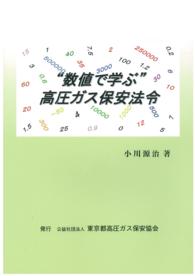- ホーム
- > 洋書
- > 英文書
- > Science / Mathematics
Full Description
The text provides an extensive discussion on hybrid intelligent techniques and their variants for application to environmental data-centric systems, often guided by a batch process. This book reviews the fundamental concepts of gathering, processing, and analyzing data from batch processes, followed by a review of intelligent tools and techniques that can be used in this direction. The book will also cover novel intelligent algorithms for the purpose of effective environmental pollution data management at par with the existing standards.
This book:
Introduces novel hybrid intelligent techniques needed to address environmental pollution for the well-being of the global environment.
Examines the latest hybrid intelligent technologies and algorithms related to state-of-the-art methodologies for monitoring and mitigating environmental pollution.
Introduces techniques for the removal of heavy metals, phenol, azo, and non-azo dyes from industrial effluents
Explores green synthesis of nanofilters and their application to environmental data management.
Illustrates the statistical prediction of nanoparticle levels for controlling vector population and Internet of Things-enabled hybrid intelligent environment management.
It is primarily written for senior undergraduates, graduate students, and academic researchers in the fields of electrical engineering, electrical and communications engineering, computer science and engineering, and environmental engineering.
Contents
1. Data-Driven Environmental Intelligence: Unlocking the Power of Data for a Sustainable Planet. 2. Hybrid Computational Intelligence Techniques for Environmental Hazard Prediction and Risk Management. 3. Microorganism Image Clustering Based on Type-2 Fuzzy Sets and Restricted Equivalent Functions. 4. Intelligent light population management. 5. Removal of Heavy Metals, Phenol, Azo, and Non-Azo Dyes from Industrial Effluents. 6. Green synthesis of nanoparticles and their applications in various fields: Analyzing the current status in 2025. 7. Harnessing Nature's Green Filter: A Comprehensive Review of Phytoremediation for Airborne Pollutants. 8. Application of Regression Models in Pollution Monitoring: Insights and Implications. 9. Preference-Leveled Evaluation Functions in Fuzzy AI Systems for Assessing Cell Abnormalities in Healthcare IoT Environments. 10. IoT-enabled Hybrid Intelligent Environmental Management. 11. Towards a Sustainable Future: A Brief Review of Renewable Energy Systems. 12. The Dynamics of Sustainability: Evaluating Social and Economic Influences on Global SDG Advancements and a Machine Learning Perspective. 13. Data-Driven Environmental Intelligence: Concluding Remarks and Future Directions.








